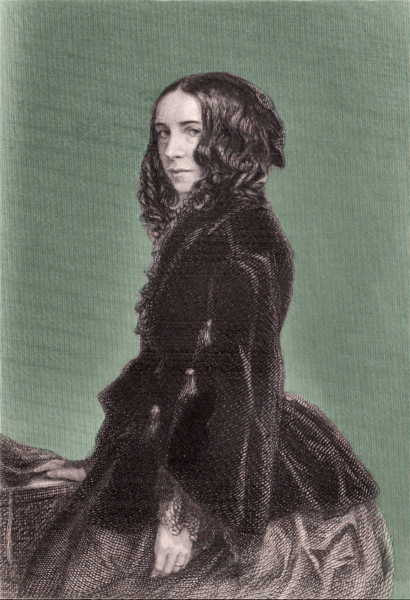
In 1836 Elizabeth Barrett Browning met aspiring poet Mary Russell Mitford. Eighteen years her senior, Browning acted as a close mentor to Mitford; when in 1842 the latter accumulated a debt of over 2,000 pounds, Browning raised the funds needed to pay it off. Below, Browning tells Mitford of the emotional difficulties of a recent visit from her Uncle Hedley.
[Monday] June 19. 1843.
I have written your message to Mr. Horne from whom I had just heard,… he having the kindness to send me three copies, besides an order for getting for you tomorrow, five & twenty copies from the third edition!—& he is not at all better, I am sorry to say,…so that I am gladder than I should be at all events, of his being likely to visit you & take refreshment from the airs under your bay-tree. Afterwards, —I hope it will be only afterwards, but he says to me, ‘directly’,—he is going down to his mother at Brighton, away from all the work & wisdom, dust & glorious tribulation of this London of ours,…& there, will learn, I trust, to be better. From what I can understand, he overworks himself in mind, hands, & imagination. He seems to me to talk all tongues, from Spanish to Syriac—is a director in a South American mine company,—writes reviews in divers quarterleys,—& commissioner-reports for government, —& dissertations upon the folios of Albertus Magnus, —& tragedies, & comedies, & histories of Napoleon—& Orions in the interstices of all!—The body will fail & faint sometimes under such a load of soul-work, & no BODY can wonder at it. I am very glad for other reasons too, that he is going to see you. Tell me what your judgement is. When you have seen the man, & I, only the picture, you will have an advantage over me; & I expect to profit from it through your communicativeness. Tell me everything—do!—
Dearest Miss Mitford—I have seen my uncle Hedley! He has come from a road with three of his sons, to settle one at Oxford, & two at school, —& then to return to his family at Lausanne, —or Paris. It was a terrible struggle for me to see him…with the great gulf of these three years between the last time & this now, & such thoughts as would be present—but I was able to cry…till I was half blinded, & disabled with a headache for five days. ‘My dear child—my dear child!—’ he said—he is very tender. The tears stood in his eyes & ran over. He knew & loved the Dearest in the world to me,—& felt, I am sure, what was in my heart in my silence—for it was impossible for me to speak even then.
Dearest Miss Mitford…you cannot think how I have dreaded to see him, ever since March when I heard that he meant to come “in the summer.” I dreaded it so much that I could not speak of it even to you…& when I heard his voice down stairs my heart seemed to move away from its place:—& to look in his face, seemed impossible. But it is over now—I thank God for that. He is the only one of my uncles whom living I love—& he is not really my uncle…not in blood—only by marriage & kindness. And what an “only” that last is!—
As to O’Connell, he has not a cloven foot I believe,—but really I would as soon rank him second to Napoleon, as Wilberforce first among great men. Can you guess what Stormie said to your opinion of Napoleon O’Connell? “Second to Napoleon,”—said he!—”Why Napoleon is not to be compared to him!”
I think so too.
After all, great or little, what is he doing or about to do in Ireland? Displaying singular & unscrupulous ability—playing at ninepins with the souls of men? and what more? Not carrying the Repeal certainly! Perhaps (& that will be a just & happy result) destroying the Irish Church Establishment!— But considering the blind apathy in England & the blind fury in Ireland, what may happen before such a result, is frightful to imagine. His power is the only certain thing. Is he not amusing the world by causing the Irish Nation to stand balanced on one toe on the single air-hung rope—”This can I do”. It makes me giddy to look on.
There! Now I am to go down stairs for the second time—& I shall be in a chair out of doors presently, though I dont [sic] “sleep on a ground floor.”
Oh! the perverseness of certain persons!—
Your own
EBB—
Notes: Daniel O’Connell was an Irish politician and orator elected to Parliament in 1828.
From Women of Letters: Selected Letters of Elizabeth Barrett Browning and Mary Russell Mitford. Edited by Meredith B. Raymond and Mary Rose Sullivan. Boston: Twayne Publishers, 1987. pp. 132-4.
FURTHER READING
Read “Orion: An Epic Poem,” for which R. H. Horne (mentioned above) is best known.
The possible diagnosis of Browning, who was chronically ill throughout her life.
A New Spirit of the Age, a critical collection of essays with which Browning assisted Horne.


